Some people spend their whole lives trying to figure out who they are and what they want out of life. While some of life’s bigger, more profound quandaries may take you decades to puzzle through by trial and error, you don’t have that kind of time when it comes to your career. In order to successfully market the product that is you in the business world, you need as much information about yourself as you can get. These self-assessment tests — whether free and self-directed, or paid and professionally assisted — can help you know thyself and boost your career.
COMPUTER WORKSTATION ERGONOMICS TEST:
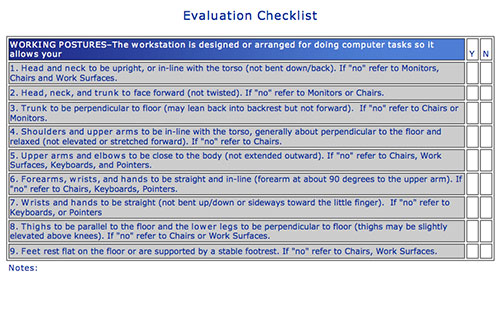 If you’re like the average white-collar office worker, a typical workday involves sitting at a desk for six to eight hours a day. People are starting to wake up to the fact that a career should not be life-threatening (as so much inactivity is). This thorough self-assessment checklist produced by the Occupational Safety and Health Administration (OSHA) will most likely reveal a handful of ergonomic mistakes you’re making that will ultimately negatively impact your health and your ability to work. Use it to transform your workstation into a place that promotes a healthy body and a healthy mind.
If you’re like the average white-collar office worker, a typical workday involves sitting at a desk for six to eight hours a day. People are starting to wake up to the fact that a career should not be life-threatening (as so much inactivity is). This thorough self-assessment checklist produced by the Occupational Safety and Health Administration (OSHA) will most likely reveal a handful of ergonomic mistakes you’re making that will ultimately negatively impact your health and your ability to work. Use it to transform your workstation into a place that promotes a healthy body and a healthy mind.MBTI FOR CAREER PLANNING:
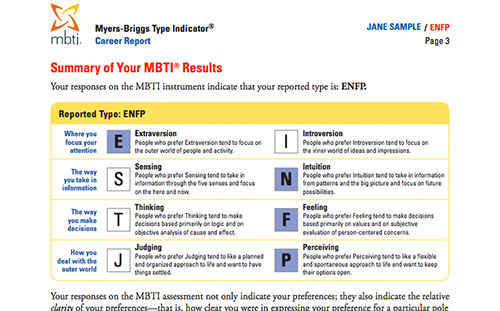 The Myers-Briggs Type Indicator is widely considered the Holy Grail of personality assessment tests, labeling individuals based on their level of extroversion, their rational nature, their irrational nature, and how they look at the world. Because the MBTI gives you insight into your preferences like how you like to communicate, how you think, and what energizes you, the test has obvious relevance to career planning and enhancing.
The Myers-Briggs Type Indicator is widely considered the Holy Grail of personality assessment tests, labeling individuals based on their level of extroversion, their rational nature, their irrational nature, and how they look at the world. Because the MBTI gives you insight into your preferences like how you like to communicate, how you think, and what energizes you, the test has obvious relevance to career planning and enhancing.PHYSICAL ACTIVITY SCORE:
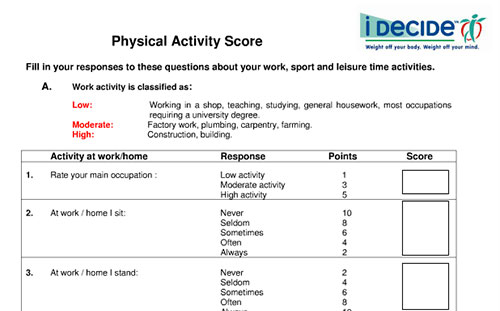 Once you’ve assessed what your seating arrangements are at work, now comes the scary part: investigating how much exercise you get. No matter how ergonomically you’re sitting, too much sitting can kill you, plain and simple. This is a handy little questionnaire from a weight loss company called iDecide that forces you to think about how much you sit at work and at home, how much you sweat, how much TV you watch, and more. The results are not incredibly scientific: your score is a phrase like “modest activity” or “active.” The benefit is in the process. Just seeing the numbers on paper may be enough to spur you to make changes that will benefit both your work and home life.
Once you’ve assessed what your seating arrangements are at work, now comes the scary part: investigating how much exercise you get. No matter how ergonomically you’re sitting, too much sitting can kill you, plain and simple. This is a handy little questionnaire from a weight loss company called iDecide that forces you to think about how much you sit at work and at home, how much you sweat, how much TV you watch, and more. The results are not incredibly scientific: your score is a phrase like “modest activity” or “active.” The benefit is in the process. Just seeing the numbers on paper may be enough to spur you to make changes that will benefit both your work and home life.PERSONALYSIS:
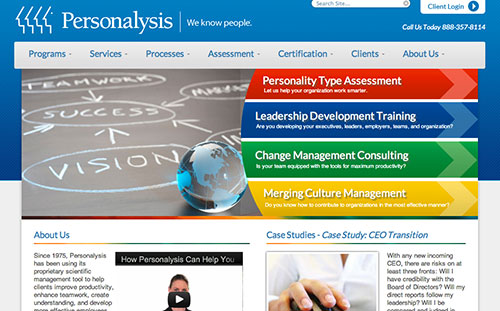 The market is flooded with companies offering personality assessment tests that cost anything from hundreds of dollars to nothing at all. Many offer only vague generalities about the subject, especially the free ones. Personalysis, on the other hand, returns information so detailed it’s almost scary. There’s info on your strengths and preferences, your expectations of yourself and others, and your motivational needs, all graphed out and color-coded. Managers often have employees take the Personalysis test to ensure they keep employees working in optimal conditions and not stressful ones. Be sure to sit down with your boss and discuss your results when you get them.
The market is flooded with companies offering personality assessment tests that cost anything from hundreds of dollars to nothing at all. Many offer only vague generalities about the subject, especially the free ones. Personalysis, on the other hand, returns information so detailed it’s almost scary. There’s info on your strengths and preferences, your expectations of yourself and others, and your motivational needs, all graphed out and color-coded. Managers often have employees take the Personalysis test to ensure they keep employees working in optimal conditions and not stressful ones. Be sure to sit down with your boss and discuss your results when you get them.JOB SATISFACTION TEST:
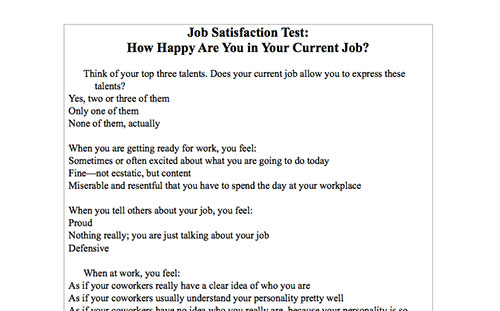 When you tell others about your job, do you feel proud, defensive, or nothing much at all? When you see your boss coming, are you glad, or do you want to crawl under the desk and hide? These are two of the questions you’ll answer on Nutrition411′s online questionnaire. We like it because rather than asking you to rate your organization’s corporate structure or some other business jargon, it uses real language and prompts you to think about workplace factors you might have been ignoring. (And it’s free.) You may find your score is low enough that you should think seriously about making a change, if you can.
When you tell others about your job, do you feel proud, defensive, or nothing much at all? When you see your boss coming, are you glad, or do you want to crawl under the desk and hide? These are two of the questions you’ll answer on Nutrition411′s online questionnaire. We like it because rather than asking you to rate your organization’s corporate structure or some other business jargon, it uses real language and prompts you to think about workplace factors you might have been ignoring. (And it’s free.) You may find your score is low enough that you should think seriously about making a change, if you can.BANKRATE.COM RETIREMENT PLANNER:
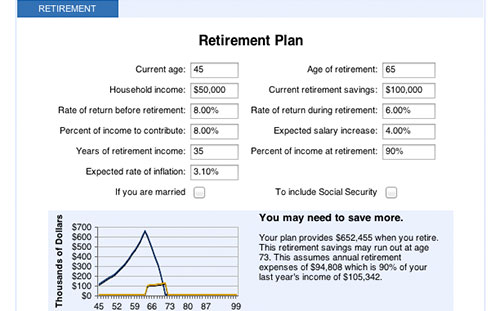 Many of us are blissfully, or even adamantly, ignorant about our retirement preparedness. If that’s you, you really can’t afford to stay that way. Using an easy retirement planning calculator like this one from Bankrate.com should be an eye-opening and sobering wakeup call to start saving now. Simply fill in the boxes to 11 specifications like your age, your rates of return, your percentage of income contribution to savings, and your age of retirement. Some of it will involve estimating; play around with different scenarios to get a good idea of what you can expect when you retire so that you can begin to plan your career accordingly.
Many of us are blissfully, or even adamantly, ignorant about our retirement preparedness. If that’s you, you really can’t afford to stay that way. Using an easy retirement planning calculator like this one from Bankrate.com should be an eye-opening and sobering wakeup call to start saving now. Simply fill in the boxes to 11 specifications like your age, your rates of return, your percentage of income contribution to savings, and your age of retirement. Some of it will involve estimating; play around with different scenarios to get a good idea of what you can expect when you retire so that you can begin to plan your career accordingly.VALUES IN ACTION:
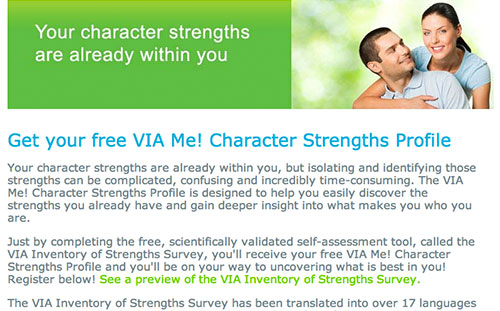 The VIA Inventory of Strengths Survey is designed to help you “build a strengths-based life” that is honest, empowering, energizing, and connecting. If your work life can’t be described by any of those words, you’ll want to check it out. The free survey is 240 questions that scientifically quantify the best features of your character so that you can improve your career and relationships. You’ll answer whether a question like “I always keep my promises” is very much like you, very much unlike you, or somewhere in between.
The VIA Inventory of Strengths Survey is designed to help you “build a strengths-based life” that is honest, empowering, energizing, and connecting. If your work life can’t be described by any of those words, you’ll want to check it out. The free survey is 240 questions that scientifically quantify the best features of your character so that you can improve your career and relationships. You’ll answer whether a question like “I always keep my promises” is very much like you, very much unlike you, or somewhere in between.THE E-TYPE TEST:
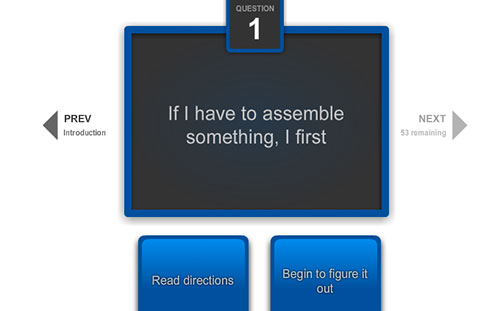 Once you’ve passed the Small Business Administration’s readiness assessment test, proceed to this quiz assembled by USA Today in conjunction with Rhonda Abrams’ book, What Business Should I Start?. If your career plan involves making the jump from employee to employer, this is a good test to take. Based on how you answer 54 questions, the test determines whether you are an investor/owner, builder/creator, or one of the other seven types of small business people.
Once you’ve passed the Small Business Administration’s readiness assessment test, proceed to this quiz assembled by USA Today in conjunction with Rhonda Abrams’ book, What Business Should I Start?. If your career plan involves making the jump from employee to employer, this is a good test to take. Based on how you answer 54 questions, the test determines whether you are an investor/owner, builder/creator, or one of the other seven types of small business people.THE BIRKMAN METHOD:
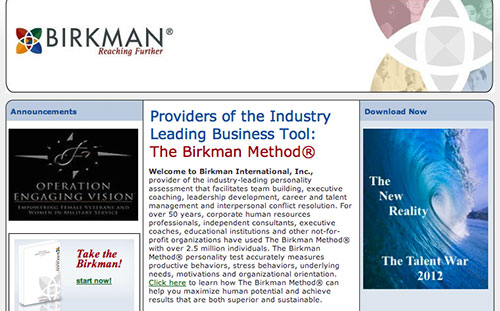 This test is probably the best one out there for enlightening people on their interpersonal and conflict resolution abilities. It analyzes a person’s usual behavior, their needs, and how they function under stress. Once you gain this information about yourself, you will be a better team player, know how to lead more effectively, and understand how to settle personnel conflicts more efficiently, or even prevent them before they have a chance to crop up.
This test is probably the best one out there for enlightening people on their interpersonal and conflict resolution abilities. It analyzes a person’s usual behavior, their needs, and how they function under stress. Once you gain this information about yourself, you will be a better team player, know how to lead more effectively, and understand how to settle personnel conflicts more efficiently, or even prevent them before they have a chance to crop up.ARDELL WELLNESS SELF- ASSESSMENT STRESS TEST:
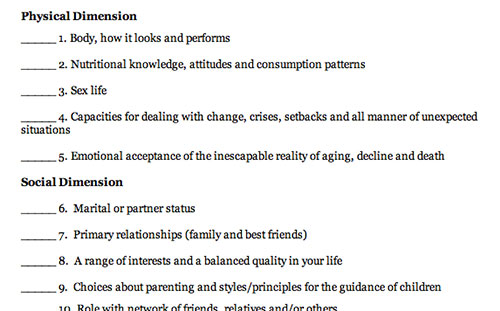 Stress. Everyone’s got it, but in a tragic catch-22, we’re all too busy to stop running around and analyze our stress levels. There are a number of free, simple assessment tests you can conduct yourself; we like the one created by wellness expert and bestselling author Don Ardell. His test incorporates the five factors that attribute to wellness: the physical, social, professional, personal, and spiritual or meaning dimensions. Give yourself a score of +3 to -3 on each of the 25 questions, and view your score and Ardell’s comments on it at the bottom of the page.
Stress. Everyone’s got it, but in a tragic catch-22, we’re all too busy to stop running around and analyze our stress levels. There are a number of free, simple assessment tests you can conduct yourself; we like the one created by wellness expert and bestselling author Don Ardell. His test incorporates the five factors that attribute to wellness: the physical, social, professional, personal, and spiritual or meaning dimensions. Give yourself a score of +3 to -3 on each of the 25 questions, and view your score and Ardell’s comments on it at the bottom of the page.MOTIVATED SKILLS TEST:
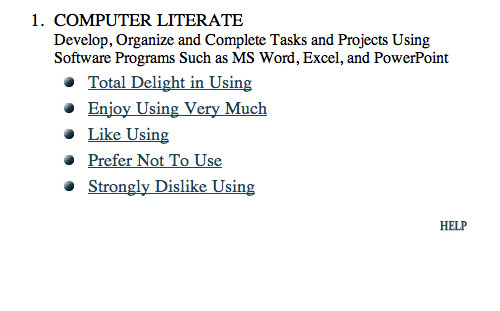 Stewart , Cooper & Coon is a corporate placement firm that offers several free, informative self-assessment tests on its website. The Motivated Skills Test guides you through a series of questions designed to help you recognize and market your career proficiencies. When you’re finished, you’ll have a printable graph of how your skills align with what you enjoy doing. It’s for anyone “under-utilized, underpaid, fighting obsolescence, burned-out, laid-off, topped-out, stagnating or feeling that something new would be a futile effort.”
Stewart , Cooper & Coon is a corporate placement firm that offers several free, informative self-assessment tests on its website. The Motivated Skills Test guides you through a series of questions designed to help you recognize and market your career proficiencies. When you’re finished, you’ll have a printable graph of how your skills align with what you enjoy doing. It’s for anyone “under-utilized, underpaid, fighting obsolescence, burned-out, laid-off, topped-out, stagnating or feeling that something new would be a futile effort.”CAREER ANCHORS:
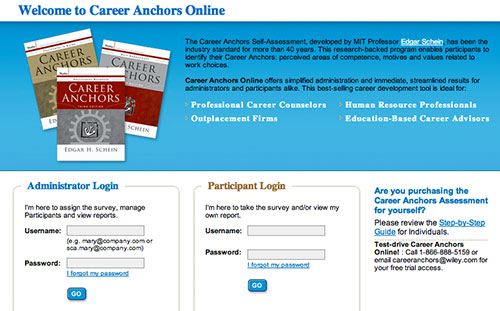 This assessment test was developed by an MIT professor over 40 years ago and has since been taken by millions of professionals. The test brings together facets of other tests on this list, helping takers pinpoint their career anchors, the places their motivation, skills, and values align. The results break down your technical and managerial competence, your creativity, how highly you value security versus independence, and more. Although it is usually applied by an HR rep or career counselor, there is a step-by-step guide for taking it on your own on the website.Sourced From : http://www.onlinecollege.org
This assessment test was developed by an MIT professor over 40 years ago and has since been taken by millions of professionals. The test brings together facets of other tests on this list, helping takers pinpoint their career anchors, the places their motivation, skills, and values align. The results break down your technical and managerial competence, your creativity, how highly you value security versus independence, and more. Although it is usually applied by an HR rep or career counselor, there is a step-by-step guide for taking it on your own on the website.Sourced From : http://www.onlinecollege.org

No comments:
Post a Comment